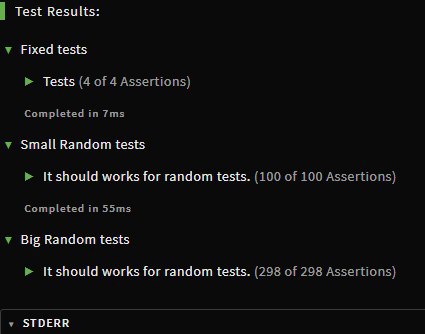t
Size: a a a
2020 June 18
у тебя до скольки рандом тестов доходило?
Биг рандом тестс?
L
Биг рандом тестс?
да
t
Сейчас чекну.
DE
хотя s может быть очень большой длинны
Да понял уже. Надо порезать по 10
p
Construct a function union that takes an input array of arrays, compares each array, and returns a new flat array that contains all elements. If there are duplicate elements, only add it once to the new array. Preserve the order of the elements starting from the first element of the first input array.
const union = arr => {
let flatArr = [].concat(...arr);
return [...new Set(flatArr)]
}
const arr1 = [5, 10, 15];
const arr2 = [15, 88, 1, 5, 7];
const arr3 = [100, 15, 10, 1, 5];
console.log(union([arr1, arr2, arr3])); // should log: [5, 10, 15, 88, 1, 7, 100]t
1-2.
p
как еще сделать лучше?
t
У меня форич :)
L
t
Круто.
L
Круто.
та, может там этих тестов пара тысяч
L
неа
L
ну я по 32 бита сделал
L
все равно не проходит по скорости
L
function binarySimulation(s, q) {
const a = new Int32Array((s.length >> 5) + 1)
for(let i = 0, k = 0; i < s.length; ) {
let i32 = 0
for(let j = 0; j < 32; j++) {
i32 |= ( s[i++]|0 ) << j
}
a[k++] = i32
}
const r = []
for(const v of q) {
switch(v[0]) {
case "I":
const start = v[1] - 1, end = v[2] - 1
let j = start;
const startFl = Math.min( end, ((start >> 5) + 1) << 5 )
//const mask = ( (1 << (startFl - j)) - 1 ) << (j & 31)
//a[j >> 5] ^= mask
while( j < startFl ) {
const byte = j >> 5
const bit = j & 31
const val = 1 << bit
//if ( !bit )
// break
a[byte] ^= val
j++
}
const endFl = (end >> 5) << 5
/// ~250
if ( j < endFl ) {
for(let i = j >> 5; i < end >> 5; i++)
a[i] ^= -1
j = endFl
}
/*
/// ~115
while( j < endFl ) {
const byte = j >> 5
a[byte] ^= -1
j += 32
}
*/
for(; j <= end; j++) {
const byte = j >> 5
const bit = j & 31
const val = 1 << bit
a[byte] ^= val
}
break
case "Q":
const i = v[1] - 1
const byte = i >> 5
const bit = i & 31
r.push( '' + ( (a[byte] >> bit) & 1) )
}
}
return r
}t
Время.
t
По времени не проходит.
t
Или потому что код недостаточно оптимизирован для задачи.
t
Всë это одно и то же.




